- Learning time
- 20 minutes
- First play time
- 30 minutes
Melee
Designed by: Rikki Tahta
Melee is a strange beast – a small game with a lot of rules that lasts no time at all.
Players begin in possession of a castle in a corner of the small board, with a unit of soldiers ruling over two provinces. Everyone has 15 coins. Before play begins, everybody has a chance to recruit units: more soldiers, knights, camps or catapults. Each costs you money, with Knights in particular being very expensive (six coins!) because they are by far the most mobile: camps and catapults don’t move at all and soldiers only one space at a time.
Having done so, the game plays out over four seasons beginning in spring. In every season players get to bid to be (or choose) the starting player. Turn order is crucial in Melee, as if you go later in the round you may not have any units left standing by the time your turn arrives! Once turn order is decided, everybody chooses a card to play – secretly. You only have three to choose from: recruit more units, tax your kingdom for money, or the most-played card of the game: Move and Attack. When you move and attack all of your units (except camps) may attack, and soldiers and knights must move before attacking (catapults may attack from distance, and if successful, destroy all enemy units in the targeted province)
Attacking is the heart of Melee, and how it works is unusual. The attacking player tells the defender how much money they have in total, for example 5 coins. Then they make a secret ‘bid’ on the attack succeeding, placing a number of coins in their first (in our example, between 1 and 5). If the defender correctly guesses what the bid is, they escape unscathed. If they guess wrong, the attacker wins and removes the defending unit/s from the board (if they displace a catapult, they get to add their own catapult) In either case, the attacker has spent their bid and loses the money. At the end of the round anyone with camps collects a coin for each camp, and anyone in possession of the central forest or lake provinces also collects a coin.
In summer and autumn, the system is the same, and in winter the only change is each player gets to play two cards instead of one. There are two possible endings: either the player controlling most provinces at the end of winter wins, or an outright victory can be claimed at any point if a player occupies another player’s castle. As well as the ‘basic’ game there is also an advanced version where each player has a special power.
Joe says
Only played once, but I loved a couple of things about Melee. Firstly the graphic style - a video game pixel art vibe that really appeals to me. And secondly the clever battling at the heart of the game. Those precious coins that you need for everything are gambled away in a battle of wits that allows for some clever double/triple think. It's almost a pub game, with a whole story built around it. The fact that, as noted, the game takes longer to teach than to play works against it, but it's worth persevering. Very neat game from a designer who has a real knack for extracting pure fun from a few simple but clever rules.
The guru's verdict
-
Take That!
Take That!
Lots
-
Fidget Factor!
Fidget Factor!
Low. It's a short game, and decisions aren't too weighty.
-
Brain Burn!
Brain Burn!
The rules aren't too complex, albeit they're slightly fiddly for the amount of game here. The brunt of the brain-burning revolves around that battling system: what to bid, what to guess? The attacker wants to spend as little as possible ideally, because they don't get any money back. But they don't want to be predictable either, so the game has a pokeresque element of table-reading to it.
-
Again Again!
Again Again!
It certainly doesn't outstay its welcome, but your mileage with Melee will vary greatly depending on how much you enjoy that battle system, and how you feel about games generally that are very in-your-face combat-driven.

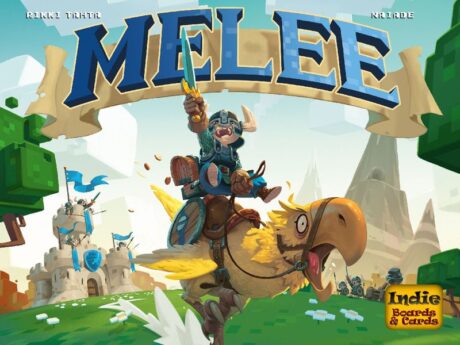

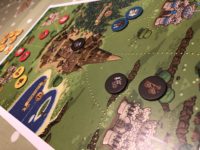
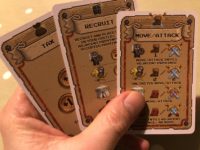
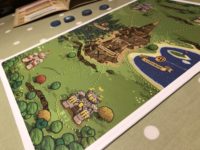


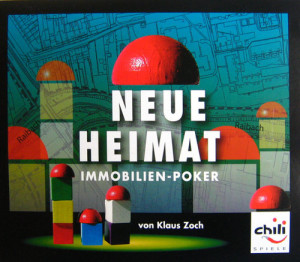
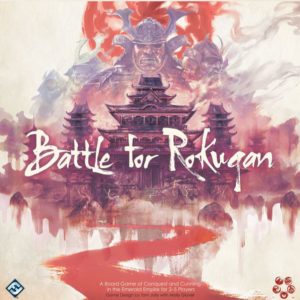

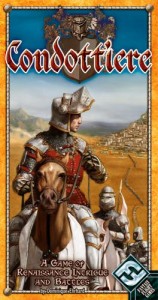
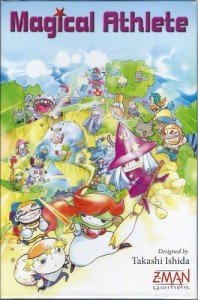
Sam says
Although Melee is very simple, it lives or dies on how you feel about hanging quite a lot of game off the central idea of bidding=fighting. I rather like it - but there's zero mitigation here. Things can go wrong very quickly and you can end up being either a spectator or king-maker; and if you're out of cash or down to a single coin your position is terribly weak. It's an interesting and unusual game, but more a curio to me than a must-play. I've enjoy this designer's similarly oddball Coup or Hurlyburly rather more, I think.